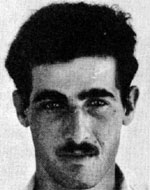Mimis, Zohar
Son of Shlomo and Rebecca. He was born on September 24, 1942 in Hadera. Graduated from the Ahad Ha’am School in Hadera; After that he studied for one year at the ORT school in Netanya. He then moved to the agricultural school in Nahalal and completed his studies there. His first impression was his quietness and modesty. He was in awe. In the course of time he began to stand out in his sincere and Yaffa attitude to man, to the environment, to nature and to agriculture that was close to his Lev, for he came out of the house of farmers. Was a nature lover and loved to travel and explore the country and these trips where he gave him great happiness in absorbing its atmosphere and leverage. The love of walks was inherent in his blood; Every Saturday while he was still in school he would go on a trip without a map and without a compass and would come to the designated place. He had tremendous endurance, and this was evident in a running competition for the Tabor area when he fell and was wounded, but he continued the race and came among the first. Like most of his classmates, he also joined the “Negev” nucleus, intended for Revivim, even though his parents waited for him to return to their farm. But he was attracted to the kibbutz and eventually became a member of Kibbutz Revivim in the Negev, because he loved the Negev with all his soul. In October 1960 he was drafted into the IDF as part of the Nahal Brigade. After the basic training period, he underwent a platoon commander course and was found to be a squad commander in a paratroop brigade. From there he went on to an officers’ course and afterward served as an officer in the minority unit. This role he wanted because he believed he could do something special. From the first tour with this unit he was very impressed to the point of enthusiasm, but afterwards there were also disappointments, because every man demanded total honesty, responsibility and failure. On one of his patrols along the border near Mount Hebron, he felt as he drove through the infiltrator. But he did not stop the car to make a fuss, jumped from the command center and himself “finished the bill” with the infiltrator; For this he received a commendation which he did not tell anyone. But it happened to be discovered. Among other things, he learned of his activity in transporting the Bedouin, after some grim episode of blood feud, families, families and their flocks, when he and his men got out of the command car, walked and transported women, children and children. And again a wife who was trapped in a base – and Zohar sat by her room all night to prevent her from being harmed. He could not bear to hurt anyone. He was kind and considerate of the situation of others to the point of mercy and forgiveness. In his military service he reached the rank of lieutenant. When he signed a permanent army service for a year, he returned to the Nahal Brigade and became the commander of the settlement in Be’erot, where he became fond of his subordinates and made connections with them beyond his military service. He was interested in everything related to the knowledge of the country, and his excitement during work was like doing holy work, he went to reserve duty in the fields of agriculture and agricultural machinery. The Gaza Strip near Kerem Shalom, and its battalion came into operation on the first day of the war The mission was to conquer the track. After his regiment was occupied Gaza area of Rafah and on the sixth day of fighting, is in Sivan Tsc”z (10/06/1967), conducted patrol officers in Rafah and its surroundings for the preparation of environmental cleansing operation and collecting weapons instead. The tour landed on a mine and he fell. He left a wife. He was laid to rest in the emergency military cemetery in Bari and was later transferred to the eternal rest of the Hadera cemetery. “Two from a Family”, a booklet in his memory and the memory of Oded Shani, published by Kibbutz Revivim. In Hadarim, the newsletter of the Ahad Ha’am school, his memory was elevated. In the book “To the Fallen,” published by his kibbutz in memory of his fallen sonsIn 1967, a memorial section was dedicated to the memory of the fallen soldiers of the United Kibbutz Movement.
